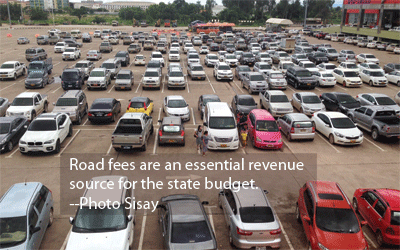Laos: Vehicle owners face doubling of road tax
Motorists in Laos will need to pay more than double the usual road tax this year depending on the size of their engine and vehicle type.
Enforcement of the fees is expected to begin next month after it was postponed from August to await consideration by the National Assembly and approval by the President.
The new Presidential Decree on Road Fees was signed by President Bounnhang Vorachit on September 20.
Deputy Prime Minister and Minister of Finance, Mr Somdy Duangdy, told Vientiane Times yesterday he would discuss the new decree with Tax Department officials, with implementation to be in October at the latest.
The new Presidential Decree on Road Fees has determined the annual fees and divided them into four vehicle groups.
The first group comprises two and three wheeled motorbikes. A motorbike with an engine less than 110cc will incur a fee of 15,000 kip, up from 8,000 kip in previous years. It will be 20,000 kip for a motorbike with a 111 to 150cc engine, 30,000 kip for a 151 to 200cc motorbike, and 100,000 kip for motorbikes over 200cc.
The second group comprises privately-owned sedans, SUVs, vans and pickups. For vehicles with an engine less than 1,000cc the fee is 100,000 kip; 150,000 kip for vehicles with engines between 1,001 to 1,600cc; 200,000 ki p for engines 1,601 to 2,000cc; 250,000 kip for 2,001 to 2,500cc; 300,000 kip for 2,501 to 3,000cc; 350,000 kip for 3,001 cc to 4,000cc; 400,000 kip for 4,001 to 5,000cc; and 500,000 kip for vehicles with engines over 5,001cc.
The third group is transport vehicles. For a small truck with an engine less than 2,500cc or total weight less than 3.5 tonnes the owner will pay 150,000 kip; 200,000 kip for medium trucks with engines of 2,501 to 5,000cc or total weight between 3.5 and 15 tonnes; 300,000 kip for large sized trucks with engines over 5,000cc and total weight between 15 and 30 tonnes; 400,000 kip for large sized trucks with engines over 5,000cc and total weight between 30 and 50 tonnes; and 500,000 kip for large sized trucks with engines over 5,000cc and total weight over 50 tonnes.
The fourth type is passenger vehicles. The owners of three wheeled tuk-tuks and jumbos vehicles will pay 50,000 kip; 150,000 kip for small vans or passenger vehicles with engines up to 2,500cc with less than nine seats including the driver’s seat; 200,000 kip for medium-sized vans and buses between 2,500 to 5,000cc or between 10 to 35 seats including the driver’s seat; and 400,000 kip for large buses with engines over 5,000cc or more than 35 seats.
Vehicles exempted from road tax include those serving state bodies, associations and foundations that are used for public services approved by related organisations such as rescue vehicles, ambulances, fire engines, radio and TV broadcast vehicles, and vehicles that serve disabled centres. Vehicles used for national peace and defence tasks are also exempt.
The fee collection does not cover heavy machinery such as excavators, tractors, forklifts, drilling vehicles, transport vehicles working on project sites, and road construction vehicles such as asphalt pavers. Fees are not charged for the vehicles of diplomats and international organisations in Laos including those serving disabled people, according to code 87.13 of the tax regulation.
Mr Somdy said the Ministry of Fin ance planned to effectively implement the collection of road taxes by allowing motorists to pay at banks. However, the ministry will coordinate with traffic police to ensure the well-organised implementation of the presidential decree.
One Vientiane resident said he owns a big truck and pays more than 100,000 kip in road fees each year, but this year would have to pay 300,000 kip. However, he urged the concerned sector to thoroughl y inspect all vehicles on the roads to make sure everyone paid their dues.
According to statistics from the Tax Department, Laos has about 1.8 million vehicles, but only about 30 percent of vehicle owners pay road tax each year.
Source: http://www.vientianetimes.org.la/FreeContent/FreeConten_Vehicle_225.htm


 Thailand
Thailand




